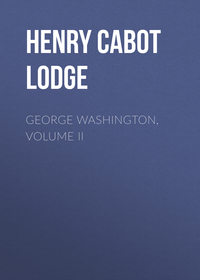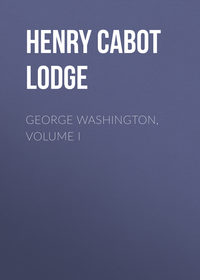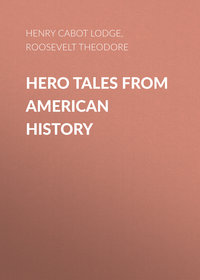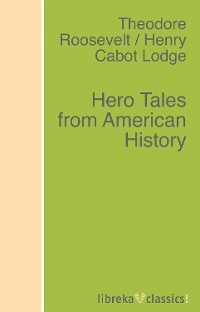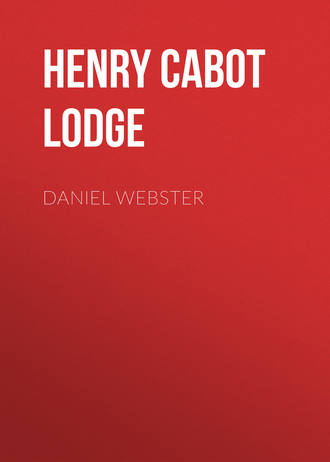 полная версия
полная версияDaniel Webster
He was studious, punctual, and regular in all his habits. He was so dignified that his friends would as soon have thought of seeing President Wheelock indulge in boyish disorders as of seeing him. But with all his dignity and seriousness of talk and manner, he was a thoroughly genial companion, full of humor and fun and agreeable conversation. He had few intimates, but many friends. He was generally liked as well as universally admired, was a leader in the college societies, active and successful in sports, simple, hearty, unaffected, without a touch of priggishness and with a wealth of wholesome animal spirits.
But in these college days, besides the vague feeling of students and professors that they had among them a very remarkable man, there is a clear indication that the qualities which afterwards raised him to fame and power were already apparent, and affected the little world about him. All his contemporaries of that time speak of his eloquence. The gift of speech, the unequalled power of statement, which were born in him, just like the musical tones of his voice, could not be repressed. There was no recurrence of the diffidence of Exeter. His native genius led him irresistibly along the inevitable path. He loved to speak, to hold the attention of a listening audience. He practised off-hand speaking, but he more commonly prepared himself by meditating on his subject and making notes, which, however, he never used. He would enter the class-room or debating society and begin in a low voice and almost sleepy manner, and would then gradually rouse himself like a lion, and pour forth his words until he had his hearers completely under his control, and glowing with enthusiasm.
We see too, at this time, the first evidence of that other great gift of bountiful nature in his commanding presence. He was then tall and thin, with high cheek bones and dark skin, but he was still impressive. The boys about him never forgot the look of his deep-set eyes, or the sound of the solemn tones of his voice, his dignity of mien, and his absorption in his subject. Above all they were conscious of something indefinable which conveyed a sense of greatness. It is not usual to dwell so much upon mere physical attributes and appearance, but we must recur to them again and again, for Mr. Webster's personal presence was one of the great elements of his success; it was the fit companion and even a part of his genius, and was the cause of his influence, and of the wonder and admiration which followed him, as much almost as anything he ever said or did.
To Mr. Webster's college career belong the first fruits of his intellect. He edited, during one year, a small weekly journal, and thus eked out his slender means. Besides his strictly editorial labors, he printed some short pieces of his own, which have vanished, and he also indulged in poetical effusions, which he was fond of sending to absent friends. His rhymes are without any especial character, neither much better nor much worse than most college verses, and they have no intrinsic value beyond showing that their author, whatever else he might be, was no poet. But in his own field something of this time, having a real importance, has come down to us. The fame of his youthful eloquence, so far beyond anything ever known in the college, was noised abroad, and in the year 1800 the citizens of Hanover, the college town, asked him to deliver the Fourth of July oration. In this production, which was thought of sufficient merit to deserve printing, Mr. Webster sketched rapidly and exultingly the course of the Revolution, threw in a little Federal politics, and eulogized the happy system of the new Constitution. Of this and his other early orations he always spoke with a good deal of contempt, as examples of bad taste, which he wished to have buried and forgotten. Accordingly his wholesale admirers and supporters who have done most of the writing about him, and who always sneezed when Mr. Webster took snuff, have echoed his opinions about these youthful productions, and beyond allowing to them the value which everything Websterian has for the ardent worshipper, have been disposed to hurry them over as of no moment. Compared to the reply to Hayne or the Plymouth oration, the Hanover speech is, of course, a poor and trivial thing. Considered, as it ought to be, by itself and in itself, it is not only of great interest as Mr. Webster's first utterance on public questions, but it is something of which he had no cause to feel ashamed. The sentiments are honest, elevated, and manly, and the political doctrine is sound. Mr. Webster was then a boy of eighteen, and he therefore took his politics from his father and his father's friends. For the same reason he was imitative in style and mode of thought. All boys of that age, whether geniuses or not, are imitative, and Mr. Webster, who was never profoundly original in thought, was no exception to the rule. He used the style of the eighteenth century, then in its decadence, and very florid, inflated, and heavy it was. Yet his work was far better and his style simpler and more direct than that which was in fashion. He indulged in a good deal of patriotic glorification. We smile at his boyish Federalism describing Napoleon as "the gasconading pilgrim of Egypt," and Columbia as "seated in the forum of nations, and the empires of the world amazed at the bright effulgence of her glory." These sentences are the acme of fine writing, very boyish and very poor; but they are not fair examples of the whole, which is much simpler and more direct than might have been expected. Moreover, the thought is the really important thing. We see plainly that the speaker belongs to the new era and the new generation of national measures and nationally-minded men. There is no colonialism about him. He is in full sympathy with the Washingtonian policy of independence in our foreign relations and of complete separation from the affairs of Europe. But the main theme and the moving spirit of this oration are most important of all. The boy Webster preached love of country, the grandeur of American nationality, fidelity to the Constitution as the bulwark of nationality, and the necessity and the nobility of the union of the States; and that was the message which the man Webster delivered to his fellow-men. The enduring work which Mr. Webster did in the world, and his meaning and influence in American history, are all summed up in the principles enunciated in that boyish speech at Hanover. The statement of the great principles was improved and developed until it towered above this first expression as Mont Blanc does above the village nestled at its foot, but the essential substance never altered in the least.
Two other college orations have been preserved. One is a eulogy on a classmate who died before finishing his course, the other is a discourse on "Opinion," delivered before the society of the "United Fraternity." There is nothing of especial moment in the thought of either, and the improvement in style over the Hanover speech, though noticeable, is not very marked. In the letters of that period, however, amid the jokes and fun, we see that Mr. Webster was already following his natural bent, and turning his attention to politics. He manifests the same spirit as in his oration, and shows occasionally an unusual maturity of judgment. His criticism of Hamilton's famous letter to Adams, to take the most striking instance, is both keen and sound.
After taking his degree in due course in 1801, Mr. Webster returned to his native village, and entered the office of a lawyer next door to his father's house, where he began the study of the law in compliance with his father's wish, but without any very strong inclination of his own. Here he read some law and more English literature, and passed a good deal of time in fishing and shooting. Before the year was out, however, he was obliged to drop his legal studies and accept the post of schoolmaster in the little town of Fryeburg, Maine.
This change was due to an important event in the Webster family which had occurred some time before. The affection existing between Daniel and his elder brother Ezekiel was peculiarly strong and deep. The younger and more fortunate son, once started in his education, and knowing the desire of his elder brother for the same advantages, longed to obtain them for him. One night in vacation, after Daniel had been two years at Dartmouth, the two brothers discussed at length the all-important question. The next day, Daniel broached the matter to his father. The judge was taken by surprise. He was laboring already under heavy pecuniary burdens caused by the expenses of Daniel's education. The farm was heavily mortgaged, and Ebenezer Webster knew that he was old before his time and not destined to many more years of life. With the perfect and self-sacrificing courage which he always showed, he did not shrink from this new demand, although Ezekiel was the prop and mainstay of the house. He did not think for a moment of himself, yet, while he gave his consent, he made it conditional on that of the mother and daughters whom he felt he was soon to leave. But Mrs. Webster had the same spirit as her husband. She was ready to sell the farm, to give up everything for the boys, provided they would promise to care in the future for her and their sisters. More utter self-abnegation and more cheerful and devoted self-sacrifice have rarely been exhibited, and it was all done with a simplicity which commands our reverence. It was more than should have been asked, and a boy less accustomed than Daniel Webster to the devotion of others, even with the incentive of brotherly love, might have shrunk from making the request. The promise of future support was easily made, but the hard pinch of immediate sacrifice had to be borne at once. The devoted family gave themselves up to the struggle to secure an education for the two boys, and for years they did battle with debt and the pressure of poverty. Ezekiel began his studies and entered college the year Daniel graduated; but the resources were running low, so low that the law had to be abandoned and money earned without delay; and hence the schoolmastership.
At no time in his life does Mr. Webster's character appear in a fairer or more lovable light than during this winter at Fryeburg. He took his own share in the sacrifices he had done so much to entail, and he carried it cheerfully. Out of school hours he copied endless deeds, an occupation which he loathed above all others, in order that he might give all his salary to his brother. The burden and heat of the day in this struggle for education fell chiefly on the elder brother in the years which followed; but here Daniel did his full part, and deserves the credit for it.
He was a successful teacher. His perfect dignity, his even temper, and imperturbable equanimity made his pupils like and respect him. The survivors, in their old age, recalled the impression he made upon them, and especially remembered the solemn tones of his voice at morning and evening prayer, extemporaneous exercises which he scrupulously maintained. His letters at this time are like those of his college days, full of fun and good humor and kind feeling. He had his early love affairs, but was saved from matrimony by the liberality of his affections, which were not confined to a single object. He laughs pleasantly and good-naturedly over his fortunes with the fair sex, and talks a good deal about them, but his first loves do not seem to have been very deep or lasting. Wherever he went, he produced an impression on all who saw him. In Fryeburg it was his eyes which people seem to have remembered best. He was still very thin in face and figure, and he tells us himself that he was known in the village as "All-eyes;" and one of the boys, a friend of later years, refers to Mr. Webster's "full, steady, large, and searching eyes." There never was a time in his life when those who saw him did not afterwards speak of his looks, generally either of the wonderful eyes or the imposing presence.
There was a circulating library in Fryeburg, and this he read through in his usual rapacious and retentive fashion. Here, too, he was called on for a Fourth of July oration. This speech, which has been recently printed, dwells much on the Constitution and the need of adhering to it in its entirety. There is a distinct improvement in his style in the direction of simplicity, but there is no marked advance in thought or power of expression over the Hanover oration. Two months after delivering this address he returned to Salisbury and resumed the study of the law in Mr. Thompson's office. He now plunged more deeply into law books, and began to work at the law with zeal, while at the same time he read much and thoroughly in the best Latin authors. In the months which ensued his mind expanded, and ambition began to rise within him. His horizon was a limited one; the practice of his profession, as he saw it carried on about him, was small and petty; but his mind could not be shackled. He saw the lions in the path plainly, but he also perceived the great opportunities which the law was to offer in the United States, and he prophesied that we, too, should soon have our Mansfields and Kenyons. The hand of poverty was heavy upon him, and he was chafing and beating his wings against the iron bars with which circumstances had imprisoned him. He longed for a wider field, and eagerly desired to finish his studies in Boston, but saw no way to get there, except by a "miracle."
This miracle came through Ezekiel, who had been doing more for himself and his family than any one else, but who, after three years in college, was at the end of his resources, and had taken, in his turn, to keeping school. Daniel went to Boston, and there obtained a good private school for his brother. The salary thus earned by Ezekiel was not only sufficient for himself, but enabled Daniel to gratify the cherished wish of his heart, and come to the New England capital to conclude his professional studies.
The first thing to be done was to gain admittance to some good office. Mr. Webster was lucky enough to obtain an introduction to Mr. Gore, with whom, as with the rest of the world, that wonderful look and manner, apparent even then, through boyishness and rusticity, stood him in good stead. Mr. Gore questioned him, trusted him, and told him to hang up his hat, begin work as clerk at once, and write to New Hampshire for his credentials. The position thus obtained was one of fortune's best gifts to Mr. Webster. It not only gave him an opportunity for a wide study of the law under wise supervision, but it brought him into daily contact with a trained barrister and an experienced public man. Christopher Gore, one of the most eminent members of the Boston bar and a distinguished statesman, had just returned from England, whither he had been sent as one of the commissioners appointed under the Jay treaty. He was a fine type of the aristocratic Federalist leader, one of the most prominent of that little group which from the "headquarters of good principles" in Boston so long controlled the politics of Massachusetts. He was a scholar, gentleman, and man of the world, and his portrait shows us a refined, high-bred face, suggesting a French marquis of the eighteenth century rather than the son of a New England sea-captain. A few years later, Mr. Gore was chosen governor of Massachusetts, and defeated when a candidate for reëlection, largely, it is supposed, because he rode in a coach and four (to which rumor added outriders) whenever he went to his estate at Waltham. This mode of travel offended the sensibilities of his democratic constituents, but did not prevent his being subsequently chosen to the Senate of the United States, where he served a term with much distinction. The society of such a man was invaluable to Mr. Webster at this time. It taught him many things which he could have learned in no other way, and appealed to that strong taste for everything dignified and refined which was so marked a trait of his disposition and habits. He saw now the real possibilities which he had dreamed of in his native village; and while he studied law deeply and helped his brother with his school, he also studied men still more thoroughly and curiously. The professional associates and friends of Mr. Gore were the leaders of the Boston bar when it had many distinguished men whose names hold high places in the history of American law. Among them were Theophilus Parsons, Chief Justice of Massachusetts; Samuel Dexter, the ablest of them all, fresh from service in Congress and the Senate and as Secretary of the Treasury; Harrison Gray Otis, fluent and graceful as an orator; James Sullivan, and Daniel Davis, the Solicitor-General. All these and many more Mr. Webster saw and watched, and he has left in his diary discriminating sketches of Parsons and Dexter, whom he greatly admired, and of Sullivan, of whom he had a poor opinion professionally.
Towards the end of the year 1804, while Mr. Webster was thus pleasantly engaged in studying his profession, getting a glimpse of the world, and now and then earning a little money, an opening came to him which seemed to promise immediate and assured prosperity. The judges of his father's court of common pleas offered him the vacant clerkship, worth about fifteen hundred dollars annually. This was wealth to Mr. Webster. With this income he could relieve the family from debt, make his father's last years comfortable, and smooth Ezekiel's path to the bar. When, however, he announced his good luck to Mr. Gore, and his intention of immediately going home to accept the position, that gentleman, to Mr. Webster's great surprise, strongly urged a contrary course. He pointed out the possible reduction of the salary, the fact that the office depended on the favor of the judges, and, above all, that it led to nothing, and destroyed the chances of any really great career. This wise mentor said: "Go on and finish your studies. You are poor enough, but there are greater evils than poverty; live on no man's favor; what bread you do eat, let it be the bread of independence; pursue your profession, make yourself useful to your friends and a little formidable to your enemies, and you have nothing to fear." Mr. Webster, always susceptible to outside influences, saw the wisdom of this advice, and accepted it. It would have been well if he had never swerved even by a hair's breadth from the high and sound principles which it inculcated. He acted then without delay. Going at once to Salisbury, he broke the news of his unlooked-for determination to his father, who was utterly amazed. Pride in his son's high spirit mingled somewhat with disappointment at the prospect of continued hardships; but the brave old man accepted the decision with the Puritan stoicism which was so marked a trait in his character, and the matter ended there.
Returning to Boston, Mr. Webster was admitted to the bar in March, 1805. Mr. Gore moved his admission, and, in the customary speech, prophesied his student's future eminence with a sure knowledge of the latent powers which had dictated his own advice in the matter of the clerkship. Soon after this, Mr. Webster returned to New Hampshire and opened his office in the little town of Boscawen, in order that he might be near his father. Here he devoted himself assiduously to business and study for more than two years, working at his profession, and occasionally writing articles for the "Boston Anthology." During this time he made his first appearance in court, his father being on the bench. He gathered together a practice worth five or six hundred a year, a very creditable sum for a young country practitioner, and won a reputation which made him known in the State.
In April, 1806, after a noble, toiling, unselfish life of sixty-seven years, Ebenezer Webster died. Daniel assumed his father's debts, waited until Ezekiel was admitted to the bar, and then, transferring his business to his brother, moved, in the autumn of 1807, to Portsmouth. This was the principal town of the State, and offered, therefore, the larger field which he felt he needed to give his talents sufficient scope. Thus the first period in his life closed, and he started out on the extended and distinguished career which lay before him. These early years had been years of hardship, but they were among the best of his life. Through great difficulties and by the self-sacrifice of his family, he had made his way to the threshold of the career for which he was so richly endowed. He had passed an unblemished youth; he had led a clean, honest, hard-working life; he was simple, manly, affectionate. Poverty had been a misfortune, not because it had warped or soured him, for he smiled at it with cheerful philosophy, nor because it had made him avaricious, for he never either then or at any time cared for money for its own sake, and nothing could chill the natural lavishness of his disposition. But poverty accustomed him to borrowing and to debt, and this was a misfortune to a man of Mr. Webster's temperament. In those early days he was anxious to pay his debts; but they did not lie heavy upon him or carry a proper sense of responsibility, as they did to Ezekiel and to his father. He was deeply in debt; his books, even, were bought with borrowed money, all which was natural and inevitable; but the trouble was that it never seems to have weighed upon him or been felt by him as of much importance. He was thus early brought into the habit of debt, and was led unconsciously to regard debts and borrowing as he did the sacrifices of others, as the normal modes of existence. Such a condition was to be deplored, because it fostered an unfortunate tendency in his moral nature. With this exception, Mr. Webster's early years present a bright picture, and one which any man had a right to regard with pride and affection.
CHAPTER II.
LAW AND POLITICS IN NEW HAMPSHIRE
The occasion of Mr. Webster's first appearance in court has been the subject of varying tradition. It is certain, however, that in the counties where he practised during his residence at Boscawen, he made an unusual and very profound impression. The effect then produced is described in homely phrase by one who knew him well. The reference is to a murder trial, in which Mr. Webster gained his first celebrity.
"There was a man tried for his life, and the judges chose Webster to plead for him; and, from what I can learn, he never has spoken better than he did there where he first began. He was a black, raven-haired fellow, with an eye as black as death's, and as heavy as a lion's,—that same heavy look, not sleepy, but as if he didn't care about anything that was going on about him or anything anywhere else. He didn't look as if he was thinking about anything, but as if he would think like a hurricane if he once got waked up to it. They say the lion looks so when he is quiet…. Webster would sometimes be engaged to argue a case just as it was coming to trial. That would set him to thinking. It wouldn't wrinkle his forehead, but made him restless. He would shift his feet about, and run his hand up over his forehead, through his Indian-black hair, and lift his upper lip and show his teeth, which were as white as a hound's."
Of course the speech so admired then was infinitely below what was done afterwards. The very next was probably better, for Mr. Webster grew steadily. This observer, however, tells us not what Mr. Webster said, but how he looked. It was the personal presence which dwelt with every one at this time.
Thus with his wonderful leonine look and large, dark eyes, and with the growing fame which he had won, Mr. Webster betook himself to Portsmouth. He had met some of the leading lawyers already, but now he was to be brought into direct and almost daily competition with them. At that period in New England there was a great rush of men of talent to the bar, then casting off its colonial fetters and emerging to an independent life. The pulpit had ceased to attract, as of old; medicine was in its infancy; there were none of the other manifold pursuits of to-day, and politics did not offer a career apart. Outside of mercantile affairs, therefore, the intellectual forces of the old Puritan commonwealths, overflowing with life, and feeling the thrill of youthful independence and the confidence of rapid growth in business, wealth, and population, were concentrated in the law. Even in a small State like New Hampshire, presenting very limited opportunities, there was, relatively speaking, an extraordinary amount of ability among the members of the bar, notwithstanding the fact that they had but just escaped from the condition of colonists. Common sense was the divinity of both the courts and the profession. The learning was not extensive or profound, but practical knowledge, sound principles, and shrewd management were conspicuous. Jeremiah Smith, the Chief Justice, a man of humor and cultivation, was a well read and able judge; George Sullivan was ready of speech and fertile in expedients; and Parsons and Dexter of Massachusetts, both men of national reputation, appeared from time to time in the New Hampshire courts. Among the most eminent was William Plumer, then Senator, and afterwards Governor of the State, a well-trained, clear-headed, judicious man. He was one of Mr. Webster's early antagonists, and defeated him in their first encounter. Yet at the same time, although a leader of the bar and a United States Senator, he seems to have been oppressed with a sense of responsibility and even of inequality by this thin, black-eyed young lawyer from the back country. Mr. Plumer was a man of cool and excellent judgment, and he thought that Mr. Webster on this occasion was too excursive and declamatory. He also deemed him better fitted by mind and temperament for politics than for the law, an opinion fully justified in the future, despite Mr. Webster's eminence at the bar. In another case, where they were opposed, Mr. Plumer quoted a passage from Peake's "Law of Evidence." Mr. Webster criticised the citation as bad law, pronounced the book a miserable two-penny compilation, and then, throwing it down with a fine disdain, said, "So much for Mr. Thomas Peake's compendium of the 'Law of Evidence.'" Such was his manner that every one present appeared to think the point settled, and felt rather ashamed of ever having heard of Mr. Peake or his unfortunate book. Thereupon Mr. Plumer produced a volume of reports by which it appeared that the despised passage was taken word for word from one of Lord Mansfield's decisions. The wretched Peake's character was rehabilitated, and Mr. Webster silenced. This was an illustration of a failing of Mr. Webster at that time. He was rough and unceremonious, and even overbearing, both to court and bar, the natural result of a new sense of power in an inexperienced man. This harshness of manner, however, soon disappeared. He learned rapidly to practise the stately and solemn courtesy which distinguished him through life.


